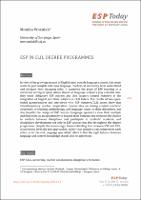Por favor, use este identificador para citar o enlazar este ítem:
https://repositorio.usj.es/handle/123456789/361
Registro completo de metadatos
| Campo DC | Valor | Lengua/Idioma |
|---|---|---|
| dc.contributor.author | Woźniak, Monika | - |
| dc.date.accessioned | 2020-03-25T11:31:35Z | - |
| dc.date.available | 2020-03-25T11:31:35Z | - |
| dc.date.issued | 2017 | - |
| dc.identifier.citation | Woźniak, Monika. (2017). Esp in CLIL degree programmes. ESP Today. 5. 244-265. 10.18485/esptoday.2017.5.2.6. | es_ES |
| dc.identifier.issn | 2334-9050 | es_ES |
| dc.identifier.uri | https://repositorio.usj.es/handle/123456789/361 | - |
| dc.description.abstract | In view of the growing amount of English used outside language courses, this study seeks to gain insights into how language teachers at university level understand and navigate their changing roles. It examines the place of ESP teaching in a university setting in Spain where almost all language lecturers play a double role: they teach obligatory ESP courses and also support content lecturers in the integration of English into their subjects as CLIL tutors. The results of two open-ended questionnaires and interviews with ESP lecturers/CLIL tutors show that interdisciplinary teacher cooperation concentrates on raising content teachers' awareness of teaching methodology and language issues in their disciplines, but also benefits the design of ESP courses. Language specialists view their multiple and fluid roles as an opportunity to expand their horizons and welcome the chance to mediate between disciplines and participate in students' academic and disciplinary development not only in ESP courses but also throughout the degree programme. Despite the increasingly blurred dividing line between ESP and CLIL at university level, the two approaches, rather than compete, can complement each other, so to this end, language specialists' effort to find the right balance between language and content knowledge should also be addressed. | es_ES |
| dc.format.extent | 22 p. | es_ES |
| dc.format.mimetype | application/pdf | es_ES |
| dc.language.iso | eng | es_ES |
| dc.publisher | UNIV BELGRADE, FAC ECONOMICS, KAMENICKA 6, BELGRADE, 11000, SERBIA | es_ES |
| dc.relation.requires | Adobe PDF | es_ES |
| dc.rights | Atribución 4.0 Internacional | * |
| dc.rights.uri | http://creativecommons.org/licenses/by/4.0/ | * |
| dc.subject | ESP | es_ES |
| dc.subject | CLIL | es_ES |
| dc.subject | University | es_ES |
| dc.subject | Teacher collaboration | es_ES |
| dc.subject | Disciplinary literacies | es_ES |
| dc.title | Esp in Clil Degree Programmes | es_ES |
| dc.type | info:eu-repo/semantics/article | es_ES |
| dc.subject.unesco | Universidad | es_ES |
| dc.subject.unesco | Desarrollo del lenguaje | es_ES |
| dc.subject.unesco | Método de enseñanza | es_ES |
| dc.relation.publisherversion | http://doi.fil.bg.ac.rs/volume.php?pt=journals&issue=esptoday-2017-5-2&i=6 | es_ES |
| dc.identifier.publicationfirstpage | 244 | es_ES |
| dc.identifier.publicationlastpage | 265 | es_ES |
| dc.identifier.doi | https://doi.org/10.18485/esptoday.2017.5.2.6 | es_ES |
| dc.rights.accessrights | info:eu-repo/semantics/openAccess | es_ES |
| Aparece en las colecciones: | Artículos de revistas | |
Ficheros en este ítem:
| Fichero | Descripción | Tamaño | Formato | |
|---|---|---|---|---|
| Monika_Wozniak_full_text.pdf | 639,09 kB | Adobe PDF |  Visualizar/Abrir |
Este ítem está sujeto a una licencia Creative Commons Licencia Creative Commons

